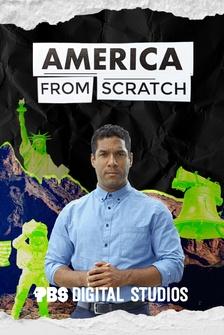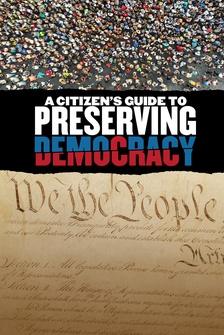JEFFREY GOLDBERG: Since you brought up violence, let me just move to something, because I want to play this brief clip of Donald Trump talking about Liz Cheney.
I want an interpretation of this.
Let me just roll this very quickly.
DONALD TRUMP: She's a radical war hawk.
Let's put her with a rifle standing there with nine barrels shooting at her, okay?
Let's see how she feels about it, you know, when the guns are trained on her face.
JEFFREY GOLDBERG: So, McKay, how are we supposed to interpret that, not as a threat, precisely, but how do you interpret it?
MCKAY COPPINS: Well, I mean, look, the argument that he's making is a familiar one about, you know, the chicken hawk, so-called.
You remember in the Bush years, you would often hear -- JEFFREY GOLDBERG: He's really upset with Liz Cheney.
MCKAY COPPINS: Right.
I mean, you have to understand that Liz Cheney probably very high on his enemies list as a Republican traitor who is now campaigning with Kamala Harris.
But, you know, the idea that, oh, she, she wants to send everyone to war but she won't go to war, that's a familiar political argument.
Normally, those arguments are not made by vividly fantasizing or laying out a scenario where the politician you're criticizing is being shot at or maimed.
But you have to remember, this is not new for Donald Trump.
I remember covering his very - - his first campaign, 2015-2016, and one of the, the first things that struck me about his rallies was that when protesters would show up and try to disrupt things, and there would be kind of scuffles between his supporters and protesters, which happens at a lot of political events, Donald Trump wouldn't ignore it or wait for security to come in.
He would gleefully narrate the action from the podium.
And, you know, he would sometimes say, tell his supporters to take a swing at the protesters.
He would say, I'll cover your legal bills.
Like the violence has kind of been woven into his political rhetoric for his entire career.
JEFFREY GOLDBERG: Vivian, just jump in on this.
Is there an intensification of this kind of rhetoric in the last months?
VIVIAN SALAMA: Oh, I mean, we've definitely seen him ramp up some of the rhetoric.
The right, of course, kind of reverses it and they say that there's been harsh and violent rhetoric from the left as well.
They point to, you know, the recent comments by Biden calling supporters of Donald Trump garbage in the past week as being offensive.
And, you know, when the former president was shot in Butler, Pennsylvania, when the assassination attempt happened, they were actually blaming the left for insightful rhetoric that kind of led to this.
And so both sides are saying that.
Now, you definitely have had this kind of rhetoric from Trump all along, and it has definitely built up in a way that has gotten more intensified, whether it's violent or just offensive.
JEFFREY GOLDBERG: You guys are both on the beat.
Is the federal government ready for what may come, federal and state officials ready for what may come?
EUGENE DANIELS: I think they hope they are right.
I think they saw what happened in 2020, both the actual violence on January 6th, but the run up to that.
And they hope that -- you know, they saw what happened, that they got a blueprint and they kind of know what they're doing.
But it's the violence that they're worried about, right?
It's not just like, oh, people are going to say that it didn't happen.
But on the day, the actual poll watchers, people who have volunteered and the folks that -- the things, we have a story on politico.com right now from my colleague, Betsy Woodruff Swan, and she talked to someone who accurately predicted January 6th by looking at all the ways in which those folks were communicating, and they're now using that to communicate and tell people how to be a poll watcher, what that volunteer process actually looks like.
So, that tells you the kinds of folks who are going to -- could be at these places.
I think, you know, we've seen these kind of fires at where people were dropping off their ballots, right, something that people weren't expecting.
And so there's all this resources that are having to be expended that folks just don't actually have the money for.
JEFFREY GOLDBERG: Right.
Peter?
PETER BAKER: This could be a big difference though in 2020.
In 2020, the complainant, the person who was making the fraud claims that were not true, was in the Oval Office, right?
He had access to the Justice Department, he had access to the military, he had access to the tools of government.
And he was the one who sat for 187 minutes during the January 6th attack and did nothing, where Mike Pence was calling the Pentagon saying, hey guys, let's get some troops here.
So, that's a big difference, right?
He will not have access to that kind of authority.
So, he will, if he loses, complain.
He will file lawsuits.
The violence is obviously the one thing you cannot control.
But his ability to change the results is far less than it was four years ago.
A lot has happened since then.
Obviously, there are some specific concerns, like the Georgia Board of Elections and a few places like that.
But most of these battleground states are led by Democratic governors, or at least in Georgia's case, a Republican governor has shown that he's willing to stand up to Trump and defend a free and fair election.
VIVIAN SALAMA: And to that point, Peter, I mean, I don't think the party was willing to push back on him as aggressively because, like you say, he was president at the time, whereas if he loses this election and there's violence incited in his name, at this point, he will have no sway over the party, the broader party.
JEFFREY GOLDBERG: You may be right.
I want to just pressure test that.
VIVIAN SALAMA: Yes.
JEFFREY GOLDBERG: McKay, on the McConnell question, like would anything be different?
I mean, you might be right, but everything that the Republican leadership has done to-date suggests possibly otherwise.
MCKAY COPPINS: So, I remember after 2020 when, when Trump went out at 2:00 A.M. and announced that he had won the election and declared victory falsely, there was in the day after some initial pushback.
I remember Marco Rubio and a couple other elected Republicans, Lindsey Graham said -- PETER BAKER: For about 24 hours.
MCKAY COPPINS: Yes, let's not do that, right?
Same thing happened after January 6th.
There was another kind of wave of pushback, but it did not last.
I was going to say, Lindsey Graham -- PETER BAKER: I'm done.
MCKAY COPPINS: If you want to look at the media -- JEFFREY GOLDBERG: So, it's a revulsion and then suppression of revulsion cycle?
MCKAY COPPINS: Because they're reacting to how the conservative media responds to the pushback, how their voters and constituents respond.
I just want to say there's one pivotal moment in this whole story.
It was probably the moment when Kevin McCarthy showed up at Mar-a-Lago a few weeks after January 6th to make amends.
And that created a permission structure for Republican elected officials to get back on board with Trump and we've never looked back since then.
PETER BAKER: And I would think, I would say, I think his counterpart, you mentioned McConnell also, in that same period decides to vote against conviction and the trial takes place citing the fact that he had already left office.
Now, they would argue that he couldn't have brought over enough to have gotten to that two-thirds majority.
I'm not sure that's true.
I think that it's very possible if McConnell had said, I'm for conviction, as permanent as he did.
And if that had been the case, Trump is disqualified from running for office again.
And that's a very different world.
He would still be in power.
But he would be a convicted felon and not running for president.
JEFFREY GOLDBERG: Let me -- in the couple minutes we have left, I'm just going to round the circle here and ask you, again, not for predictions but what you as reporters are going to watch closely next week as a sign of where the vote is going and where the other issues that are surrounding this election, the violence question, things like that.
Vivian, what are you looking at?
VIVIAN SALAMA: Early voting has been really interesting this year.
I think just the results that we've seen so far, the turnout by different groups, Republicans in Arizona, and Democrats and women, especially in Pennsylvania.
I found that to be really interesting this time.
And we could really have a good sense on Tuesday where things stand just because of early voting.
JEFFREY GOLDBERG: Right.
McKay?
MCKAY COPPINS: I'm going to be looking on election night for what time Donald Trump goes on camera, okay?
And this is important because in 2020, Steve Bannon, his former adviser who's fresh out of prison, recently said his only mistake that night was waiting until 2:00 A.M.
He should go on at 11:00 P.M. and declare victory regardless of what the results are.
I could see Trump doing that, trying to kind of command the narrative right away.
So, I'll be looking for that.
JEFFREY GOLDBERG: Do you actually think he could go out regardless of whatever numbers are being broadcast and just say I won the presidency?
COPPINS: I think that's more likely.
JEFFREY GOLDBERG: I'm asking like I haven't covered this (INAUDIBLE).
MCKAY COPPINS: Are you familiar with Donald Trump?
JEFFREY GOLDBERG: He can go at it 10:00.
I mean, you can do whatever you want.
California, he might go out tonight and just declare preemptive victory based on the early vote.
Eugene?
EUGENE DANIELS: The suburbs.
I think some, you know, cover Democrats and Harris a bit more.
And so something's happening in how, one, how she's in the campaign have been focused on the suburbs.
And even as they look and see like the leeching of -- the possible leeching of black voters and brown voters, right.
And so it was like, can they make up in the suburbs what they're losing and other aspects of the electorate?
And if so, what does that, how does that change the Democratic Party and how they talk to voters in their policies?
JEFFREY GOLDBERG: Peter?
PETER BAKER: I'm interested in young voters.
Actually, I'm really fascinated to see whether they turn out in large numbers for Harris with the abortion issue on the ballot, basically for them, or whether Gaza, in fact, does diminish the support she might get from younger, more liberal, you know, Americans who can't stomach the idea of voting for somebody who's, you know, seen as too pro-Israel.
And that's a real question.
Do they -- JEFFREY GOLDBERG: In Michigan or everywhere?
PETER BAKER: Yes, in Michigan.
But I think the youth vote is -- I mean, I think it's a small part of it.
But in any of these states, a small part could be enough.
JEFFREY GOLDBERG: Right.
Well, we'll be back here next week maybe with some answers and maybe with more speculation.
But, unfortunately, for now, we have to leave it there.










